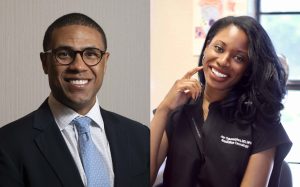Early Career Radiation Oncologists Stay Busy as Volunteers
By Rodney Campbell, ABR Communications Manager
2024;17(4):8

As members of the ABR’s Radiation Oncology Initial Certification Advisory Committee, Drs. Michael LeCompte and Joy Ogunmuyiwa serve as intermediaries between the organization and candidates. Their voices are vital as the ABR seeks to improve the initial certification process for radiation oncologists.
Their thoughts are also in demand across their specialty. Both serve their field as volunteers for associations and societies.
“An initiative across radiation oncology has been to ensure that those in their early careers are having their voices heard,” Dr. LeCompte said.
The two have filled that need by earning leadership roles for various organizations. Dr. LeCompte recently served as chair of the Association of Residents in Radiation Oncology (ARRO) and will soon take the resident ex-officio seat on the American Society for Radiation Oncology (ASTRO) Board of Directors. He’s also part of ASTRO’s Health Equity, Diversity, and Inclusion Steering Committee.
Dr. Ogunmuyiwa is on the executive board of the Society of Women in Radiation Oncology as the Diversity, Equity, and Inclusion Chair. She’s also on ARRO’s Executive Committee and Global Health Subcommittee. Her family came to the US from Nigeria.
“I met most of the people I know through volunteering,” she said.
Dr. Ogunmuyiwa finds that her voice can be amplified as a radiation oncology volunteer. Of the more than 36,000 physicians and physicists participating in ABR Continuing Certification, 12 percent are radiation oncologists.
“One of the reasons why I like to get involved is I know that because we’re a smaller field, we’re able to make an impact,” said Dr. Ogunmuyiwa, who also holds a Master of Public Health degree from Harvard.
Dr. Ogunmuyiwa is a third-year resident at NewYork-Presbyterian Hospital. Getting involved as a volunteer for associations and societies gives her the opportunity to expand her interests and experiences beyond working with colleagues at the hospital.
“It’s nice to go to these events or meetings and interact with other residents and practicing clinicians,” she said. “I’m seeing the same four or five faces every day (at my program). It’s nice to interact with other people.”
As a fourth-year resident at Johns Hopkins, Dr. LeCompte’s free time is limited. He believes he needs to be careful to not overextend himself, no matter how important the cause. He said that not being available to give full effort would be a disservice to an organization.
“It’s a balancing act,” he said. “Being honest with yourself and others about your time and what you can realistically contribute is the first part to successfully being a volunteer. I’ve been fortunate to have friends, family and colleagues who understand when I say no to a new opportunity because they know that it’s something I would do if I had the time.”
Dr. Ogunmuyiwa’s NewYork-Presbyterian colleagues often stress the importance of volunteering to their residents. Hearing those endorsements makes her realize the importance of giving time back to her specialty.
“Some of my attendings are involved in different organizations,” Dr. Ogunmuyiwa said. “They’re always making sure that we know that radiation oncology isn’t just clinical work. It’s also about how you volunteer and interact with others.”
There are many reasons why the two enjoy volunteering. Despite being an introvert, Dr. LeCompte eagerly jumps into committee work. He has benefitted from the efforts of former residents and wants to ensure that he’s doing the same.
“It really comes from a place of wanting to help,” he said. “I know those in front of me made it better for me and I want to be that person for those behind me.”


